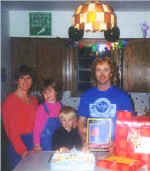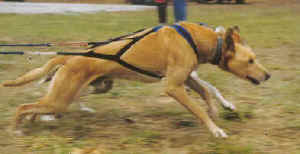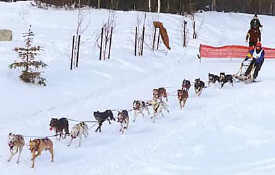Name:
Kennel:
Birthplace:
Home Town:
Occupation:
E-mail:
Web Site: |
Ed Streeper
Streeper Kennels
Ft. Nelson, British Columbia, Canada
Osage, Minnesota (Canadian citizen)
Musher, Dude Rancher
streeper@eot.com
www.fastestreeperkennel.com |
Introduction
Amy and I have a daughter, Chloe, and a son, Calvin. We live on a hobby
ranch with horses, goats, chickens, ducks, cats, peacocks, one steer, rabbits and many
dogs.
I started in the Ft. Nelson Sled Dog Association 27 years ago. I've been
a long time member of ISDRA, North Star, ASDRA, ADMA and many other clubs.
Currently president of the Frazee Minnesota Sled Dog Club. I enjoy
helping to organize races.
Background
What is your primary sled dog activity or area of interest?
I specialize in Open Class and have competed and won races from 3 to 50 miles.
How long have you been involved with sled dogs?
27 consecutive years racing open class.
What sparked your initial interest in sled dogs?
Acquiring two crossbred husky pups at the local annual sled dog race.
If you remember your very first time behind a team of dogs, tell
us about it.
My first race  --I was 14 years old, on
a new sled, driving the biggest team from 8 to 16 dogs. I lost the team, got picked up by
my dad, who was in the only race he would ever run. My dad got off the team with five
miles to go and let me drive to the finish line. So I made it around the trail, but it
took two teams to do it! Who knows-if I'd been the one to get a ride in the vehicle the
last five miles, maybe I would have been disheartened and quit then and there.
--I was 14 years old, on
a new sled, driving the biggest team from 8 to 16 dogs. I lost the team, got picked up by
my dad, who was in the only race he would ever run. My dad got off the team with five
miles to go and let me drive to the finish line. So I made it around the trail, but it
took two teams to do it! Who knows-if I'd been the one to get a ride in the vehicle the
last five miles, maybe I would have been disheartened and quit then and there.
Who have been your mentors?
In the order they affected my sled dog life:
1. Adolfus Capot-Blanc - Ft. Nelson Native Indian and local mushing
star.
Gave me free of charge Tanda, a female ½ Sibe, ½ German Shepherd leader that won
Yellowknife. Tanda was the mother of our super leader, Lucy, who made the name Streeper
famous in the mushing world.
2. Harris Dunlap
Harris was awesome in my eyes for many years. I envied his medical knowledge about the
dogs.
3. Peter Norberg (deceased)
Peter had the biggest affect on me of all my mentors. He taught me how to make dogs tough
enough to handle race pressure and how to run hard around the entire race course rather
than saving until the last two or three miles before asking the team to drive hard for the
finish line. Peter Norberg was the first Canadian to win the Open North American in
Fairbanks. I was the second. Peter never raced Anchorage but won many open and
mid-distance races in his short career.
4. George Attla
George taught me in the beginning how to be dedicated and devoted enough to be able to
beat him and win the Anchorage Fur Rondy. He also taught me the fact that super dogs, no
matter what, get old fast!
5. Gareth Wright
Gareth taught me to enjoy the wheeling and dealing aspect of the game. To dicker and
barter for the fun and money.
Kennel Management
What size kennel do you operate?
We maintain between 70 to 100 dogs counting puppies.
What type of tether/bowl system do you use?
We use 2 inch pipe--four feet in the ground, two feet above with a piece of rebar (two
feet in the pipe with an 18 inch arm) inserted into the pipe. We have sand and dust, so
it's nice to have the chains off the ground. Our dog dishes set on four-sided 2" x
6" frames. It saves wear and tear on the dishes and is harder for the dogs to kick
around.
What are the most important considerations in housing sled dogs?
A few important housing tips are:
1) A tethered dog gets more exercise than a kenneled dog.
2) Standing on ground is easier on the shoulder muscles and joints than cement or wood
flooring.
3) A perimeter fence around females for sure, and hopefully the entire dog lot, is wise
for safety with loose dogs.
Give us an overview of your feeding program.
We feed 85% meat, 15% cereal, eggs, bone meal, and vitamins. Proper diet is key to a super
team.
The Dogs

Streeper's Gunner
What breed(s) do you work with?
A combination of many hound lines crossed in with a few Canadian and Alaskan husky mixed
breeds. All of our dogs currently are 6 to 15 generations down from dogs that I used to
win many races, on one side or both in bloodlines.
What physical characteristics do you look for in your dogs?
Speed, toughness, attitude, desire.
What mental or emotional attributes do you require in your dogs?
I like sensitive type dogs with smart brains. I don't like belligerent, stupid dogs.
Tell us about an all time favorite dog or two.
My all time favorite dog - Lucy (Super Dog Deluxe)!
- She led our main string for 10 years.
- Never lame - never missed a meal.
- Never sick - never missed a race.
- Won Anchorage and ONAC running every heat on lead.
- Had first litter of pups at 10 years old.
- Had three litters.
- She was ¼ German Shepherd, ¼ Siberian and ½ Wright Alaskan Husky.
- She won many, many races of different lengths including three 50 mile
heats in Yellowknife, NWT.
Puppies
What criteria do you use for selecting breeding stock?
We breed on performance only unless we run out of a certain line we want to hang
onto. Too many mushers breed by bloodlines alone. Regardless of the bloodline, I feel
individual performance must decide or prove who should be bred to improve overall
performance.
Do you use any pre-training evaluation of puppies?
Not really. We just keep an eye on them as soon as they can move around.
What method do you use for starting pups?
We start handling pups early. Once they're weaned we call and run them around in
big pens. When the pups are 6 to 8 weeks old we take them from pens for longer but short
runs. Once the pups can outrun us on foot, we let them chase the four wheeler. We
introduce pups to harness at 4 to 6 months of age.
What is the most important thing you look for in a young dog?
 Speed, toughness,
attitude, drive. (See #2 under Dogs)
Speed, toughness,
attitude, drive. (See #2 under Dogs)
At what point do you decide a youngster is likely to make it in
your team?
We have a pretty good idea after one year, but there are always exceptions.
Training
What is the training/racing philosophy of your kennel?
To train hard, steady and to be competitive in every race we enter.
Do you have specific training goals for your team(s)?
We like to have the dogs up to a certain mileage and speed at certain times in the
calendar year if possible.
What do you consider most important to accomplish in training?
To get the dogs ready to withstand all conditions they will encounter, including mileage
and heat factor.
What is the most indispensable training equipment you use?
Cable ganglines in the fall, the G-line (also known as a snub line) on my sled and the
Indian quick release, good snowhook and training sled. The 4 wheeler was a big step
forward compared to wheeled rigs with no speed control or reliable brakes for big teams.

Amy racing the Fur Rondy in Anchorage, Alaska
Racing
How do you choose which races to enter?
We like to let the team dictate which races to enter unless a personal reason arises. When
the team is strong I like to race at the oldest, most prestigious races.
What are your strengths as a racer?
My biggest strength now in my career is my experience. I've been in a lot of haywire
situations with my dog team and had to learn how to get back on track, fast!
What do you consider your weaknesses, if any?
My biggest weakness is probably lack of financial backing. I hate most monthly bills that
life causes. · Do you having a mushing career goal? To be remembered after I'm gone! 
What does it take to win?
Good dogs, good food, good training, and good luck! These are the four main ingredients to
a winning team.
The Future
What is your vision of the future of sled dog sports?
I think the sport will continue to grow in all aspects. I hope the Olympics will have sled
dog racing in my lifetime. I would like to see pari-mutuel betting allowed at certain
races.
What can individual mushers do to support and promote the sport?
I would like to see more mushers help put on a race. Most races need more volunteers and
the mushers know what it takes.
What part do clubs and organizations play in sport development?
Without organizations and clubs we will never be allowed into the Olympics. People need
and want guidance in many areas.
What advice would you give a beginning musher?
Be very careful whom you pick for mentors.
Try to be honest with yourself with expectations for your team. Don't
cheat your training program and blame the dogs.
Always be aware of your worst dog and try to improve or replace that
dog.
Don't get too many dogs too fast.
Right from the start try to appreciate and respect the dogs.

Ed racing the IFSS World Championship, Fairbanks, Alaska
Anecdote
Tell us about one or two of your most memorable sled dog
experiences.
Many years ago my brother and I hooked up 34 dogs to a little all-steel sled with one
snowhook. We drove the team 3 miles just for fun, with each doing 1 ½ miles.
When I won the 50th "Golden Anniversary" of the Anchorage Fur
Rondy, I was the first Canadian to ever with the race-it was awesome!
My first mass start race was a real thrill and I still enjoy them.
Comments
Any final comments about sled dog sports?
Good luck to all who harness sled dogs in all your adventures

[back to Interview list]

top of page |
home |
feedback | search




